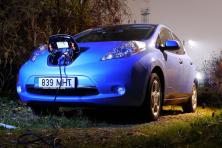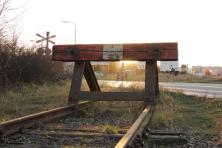A new Sightline report details huge financial risks for Australian coal export startup.
Ambre Energy, the start-up Australian company backing two of the coal export proposals in the Northwest, has been trying to pass itself off as a deep-pocketed player in the global coal business. It has been promising hundreds of millions of dollars in investments to local businesses and communities, while pushing agencies hard for fast track approvals of their permit. The warning signals have been clear for some time that Ambre may be more fast talk than substance, something we highlighted in a post last fall: Take a hard look at salesman before falling for coal export sales pitch.
Clark Williams-Derry at the Sightline Institute has just completed a very detailed report that digs much deeper, and shows that Ambre may be all hat and no cattle. This report, Ambre Energy: Caveat Investor, paints a clear picture of a shaky startup company with huge financial losses, no track record of success, failed business ventures, bad business reputation and cloudy prospects. Ambre’s only hope seems to be that regulators will ignore tens of thousands of public comments and these clear warning signals and fast-track their permit applications, giving them some slight chance of raising the more than a billion dollars that they will need to complete these massive projects. Sightline’s report raises serious questions that should be answered by investors, companies and government officials that are considering doing business with Ambre or letting them build huge projects in our community. Sightline’s report clearly shows that anyone dealing with Ambre needs to understand that it is a high risk gamble. As Greenpeace’s Joe Smyth puts it, Ambre faces an enormous number of challenges trying to become “a true planet-destroying coal titan.” They could almost earn our sympathy (except for that part about destroying the planet).
So why should this matter? Is Ambre just a shaky player in an otherwise viable industry? Ambre is the leading force behind two of the three export proposals that have actually filed permit applications, the Morrow-Pacific Project in the Ports of Morrow and St. Helens, Oregon, and the Millenium Bulk Logistics Project in Longview, Washington. And if you take a closer look at companies pushing for coal exports from the Northwest, it seems clear that the biggest players are either desperate, because they have no strategic options, or are highly speculative gambles, like Ambre. The biggest North American coal companies, such as Peabody, Arch and Cloud Peak, are valued by the market at small fractions of their share prices as recently as 18 months ago, and are facing rapidly collapsing demands from United States utilities and power generators. Although giants in their industry, they face enormous challenges getting enough capital to continue operations. Arch, for example, recently borrowed hundreds of millions of dollars at a 9.8% interest rate – 3-4% higher than the going rate for corporate junk bonds. They are losing money on most of their current operations, including their early efforts to export coal to Asia. They are vigorously pursuing these exports, however, because they literally have no good strategic choice other than winding down their US operations. If the only tool you have is a hammer, everything begins to look like a nail.
Ambre’s prospects and business reputation also matter a great deal for communities that will be taking a large gamble if the company goes ahead with its plans. The region has a long history of small communities that have been left high and dry by corporate ventures that didn’t pan out and left messes in their wake. The Millenium project in Longview, for example, sits on a site that was abandoned by another fly-by-night company, Chinook Ventures, that had great plans and left the community with piles of toxic materials and not even a goodbye note. Over the past decades, coal export proposals were started and then terminated in Portland and Los Angeles as markets turned, leaving the ports with costs and the need to find longer-term tenants. At minimum, officials should be thinking about bonds to cover costs of cleanup and redevelopment of the sites if Ambre’s future performance lives up to its past record of (non)success.
Ultimately, we need to remember that Ambre and the other aspirants in the coal export derby are trying to use public resources to make profits. They are hoping to export coal owned by federal taxpayers, build terminals on state-owned acquatic lands, and get states and local governments to pay most of the cost for numerous rail and transportation improvements. They are holding themselves out as good business partners and dangling the prospect of jobs and community investments if we don’t delay, and sign up today.
Caveat Investor, indeed! It is also past time for the public and government officials to take a long hard look before they sign up for Ambre’s smooth sales pitch.




